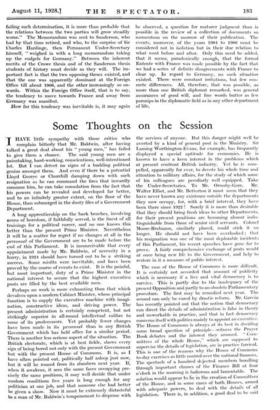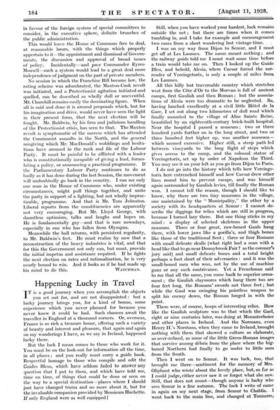Some Thoughts on the Session
T HAVE little sympathy with those critics who -I- complain bitterly that Mr. Baldwin, after having talked a great deal about his " young men," has failed to give them a chance. The said young men are a painstaking, hard-working, conscientious, well-intentioned lot. But I can detect no signs of a budding political genius amongst them. And even if there be a potential Lloyd Georpe or Churchill damping down with such resignation as he can command the fires that inwardly consume him, he can take consolation from the fact that his powers can be revealed and developed far better, and to an infinitely greater extent, on the floor of the House, than submerged in the dusty files of a Government Department.
A long apprenticeship on the back benches, involving aeons of boredom, if faithfully served, is the finest of all trainings for a political career, and no one knows this better than the present Prime Minister. Nevertheless it will be a matter for regret if no changes at all in the personnel of the Government are to be made before the end of this Parliament. It is inconceivable that every appointment made by Mr. Baldwin, of necessity in a hurry, in 1924 should have turned out to be a striking success. Some misfits were inevitable, and have been proved by the course of events to exist. It is the painful, but most important, duty of a Prime Minister in the national interest to secure that the highest executive posts are filled by the best available men.
Perhaps no work is more exhausting than that which devolves upon a modern Cabinet Minister, whose principal function is to supply the executive machine with imagi- nation, constructive ideas, and driving power. The present administration is certainly competent, but not strikingly superior in all-round intellectual calibre to some of its predecessors. Yet probably fewer changes have been made in its personnel than in any British Government which has held office for a similar period. There is another less serious aspect of the situation. The British electorate, which is at best fickle, shows every sign of being bored not only with the present Government but with the present House of Commons. It is, as I have often pointed out, politically half asleep just now, but it will be roused from its slumbers next year. If, when it awakens, it sees the same faces occupying pre- cisely the same positions, it may well decide that under modern conditions five years is long enough for any politician at one job, and that someone else had better be given a show. Now it must be extremely distasteful to a man of Mr. Baldwin's temperament to dispense with the services of anyone. But this danger might well be averted by a kind of general post in the Ministry. Sir Laming Worthington-Evans, for example, has frequently displayed a special aptitude for economics. He is known to have a keen interest in the problems which at present confront British industry. Yet he is com- pelled, apparently for ever, to devote his whole time and attention to military affairs, for the study of which some of his colleagues are peculiarly well equipped. Take the Under-Secretaries. To Mr. Ormsby-Gore, Mr. Walter Elliot, and Mr. Betterton it must seem that they have never known any existence outside the departments they now occupy, for, with a brief interval, they have been there since 1922 ! Surely it is more than desirable that they should bring fresh ideas to other Departments, for their present positions are becoming almost indis- tinguishable from those of senior civil servants. Colonel Moore-Brabazon, similarly placed, could stick it no longer. He should not have been overlooked ; that his resignation was one of the most deplorable incidents of this Parliament, his recent speeches have gone far to prove. A fairly comprehensive exchange of posts would at once bring new life to the Government, and help to restore in it a measure of public interest.
The case of the House of Commons is more difficult. It is certainly not accorded that amount of publicity which is necessary if a live and vital democracy is to survive. This is partly due to the inadequacy of the present Opposition and partly to an obsolete Parliamentary procedure. The first may be remedied next year. The second can only be cured by drastic reform. Mr. Garvin has recently pointed out that the notion that democracy can direct the details of administration is false in theory and unworkable in practice, and that in fact democracy concerns itself with politics mainly to appoint an executive. The House of Commons is always at its best in deciding some broad question of principle—witness the Prayer Book debates and the interest they aroused. " Com- mittees of the whole House," which are supposed to supervise the details of legislation, are in practice farcical. This is one of the reasons why the House of Commons to-day exercises so little control over the national finances. The spectacle of a hundred dejected members bundling through important clauses of the Finance Bill at four o'clock in the morning is ludicrous and lamentable. The solution would appear to lie in the creation of Committees of the House, and in some cases of both Houses, armed with adequate powers, to deal with the details of all legislation. There is, in addition, a good deal to be said in favour of the foreign system of special committees to consider, in the executive sphere, definite branches of the public administration. This would leave the House of Commons free to deal, at reasonable hours, with the things which properly appertain to it—the appointment and dismissal of Govern- ments, the discussion and approval of broad issues of policy. Incidentally—and pace Commander Eyres- Monsell—such a system would lead to a great deal more independence of judgment on the part of private members. No session in which the Franchise Bill became law, the rating scheme was adumbrated, the Maxton-Cook revolt was initiated, and a Protectionist agitation initiated and quelled, can be described as wholly dull or uneventful. Mr. Churchill remains easily the dominating figure. When all is said and done -it is around proposals which, but for his imagination and drive, would never have seen the light in their present form, that the next election will be fought. Mr. Baldwin, by his firm and judicious handling of the Protectionist crisis, has seen to that. The Maxton revolt is symptomatic of the success which has attended the Communist assaults in the North, and the general misgiving which Mr. MacDonald's wobblings and hesita- tions have aroused in the rank and file of the Labour Party. It must be painful to be afflicted with a leader who is constitutionally incapable of giving a lead, formu- lating a policy, or announcing a practical programme. If the Parliamentary Labour Party continues to do as badly as it has done during the last Session, the movement will undoubtedly go back in the country. I can see only one man in the House of Commons who, under existing circumstances, might pull things together, and unite the party in support of a fighting, but not wholly imprac- ticable, programme. And that is Mr. Tom Johnston. Liberal reports from the constituencies are apparently not very encouraging. But Mr. Lloyd George, with dauntless optimism, talks and laughs and hopes on. He is fundamentally gay—and that is rare nowadays, especially in one who has fallen from Olympus. Meanwhile the ball returns, with persistent regularity, to Mr. Baldwin's feet. He must realize by now that a reconstruction of the heavy industries is vital, and that for this the Government not only can, but must, provide the initial impetus and assistance required. If he fights the next election on rates and rationalization, he is very nearly bound to win. And it looks as if he had made up





























 Previous page
Previous page